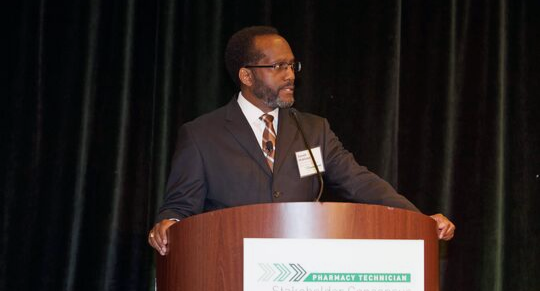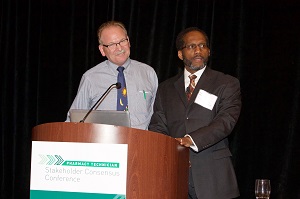National Conference of Pharmacy Stakeholders Seeks Consensus on Pharmacy Technician Qualifications
Pharmacy Technician Stakeholder Consensus Conference Focuses on Improving Medication Safety and Advancing Patient Care
 |
March 8, 2017
WASHINGTON, DC -- Pharmacy and pharmacy technician leaders from multiple practice sectors gathered in Irving, Texas, February 14-16, to explore consensus on standards and qualifications for entry-level and advanced practice pharmacy technicians. Hosted by the Pharmacy Technician Certification Board (PTCB), the historic 3-day Pharmacy Technician Stakeholder Consensus Conference brought together more than 100 individuals on-site to provide input to PTCB and develop recommendations that support the evolution of pharmacy technician roles as pharmacists take on increasing responsibility for direct patient care. More than 350 additional pharmacy and pharmacy technician professionals participated by interactive webinar.

“PTCB’s primary mission is to advance medication safety,” said PTCB Executive Director and CEO Everett B. McAllister, MPA, RPh. “To do so, PTCB seeks input from the pharmacy community in the development of future pharmacy technician education requirements and qualifications for certification. The consensus conference outcomes will provide invaluable information from across the practice spectrum to guide future program decisions.”
Larry Wagenknecht, BSPharm, RPh, Chair of the PTCB Board of Governors, and CEO of the Michigan Pharmacists Association, said conference participants focused on advancing patient safety throughout their deliberations. “This 3-day event provided an opportunity for our profession to listen to each other,” he said. “Because of the diversity of sectors within pharmacy, there was a lot of work involved in coming to consensus, and because participants were committed to finding common ground, we made significant progress. We all have a responsibility to our patients to get this right.”

Christopher Jerry, President and CEO of the Emily Jerry Foundation, described the tragedy he suffered when his 2-year-old daughter suddenly lost her life after a pharmacy technician prepared her chemotherapy solution using a fatal concentration of sodium chloride. Mr. Jerry said that after his daughter’s death, he committed his life to bringing about change to prevent medication errors. “Medical errors are a leading cause of death in the US,” he said. “The pharmacy profession must develop uniform standards for pharmacy technicians, and then articulate them to state boards. State boards of pharmacy understand the importance of public safety, but they need the collective support of the profession to be on the same page.”
Four expert panels discussed the technician workforce, optimal requirements for entry-level technicians, opportunities in advanced technician practice, existing state-to-state inconsistencies in technician regulations, and successful models of standardization, including those in place in Canada and North Dakota.

Participants broke into work groups to develop statements on educational requirements, reduction in state-by-state regulatory variations, recognition of competencies of advanced technicians, and the need for public confidence in pharmacy technicians’ knowledge, skills, and abilities.
“A diverse group of stakeholders worked to identify middle ground and address important issues, such as the need for the profession to get on the same page regarding entry-level knowledge and uniform education standards for technicians,” said Matthew Osterhaus, BSPharm, FAPhA, FASCP, Owner/Pharmacist, Osterhaus Pharmacy. “We found ourselves rallying around a common mission and reachable goals, while balancing the unique needs of each sector of the profession.”
“The conference was a success because participants came from a range of practice areas, openly shared their views, and fully engaged in discussions,” said PTCB CEO McAllister. “At the conclusion, attendees indicated a desire to speak with one voice, and work in parallel with state boards to advance patient safety.”

Advisory Committee
|
Jason Ausili, PharmD |
Timothy R. Koch, RPh., PD, CHC |
|
Malcolm Broussard |
Janet M. Liles, MS, CPhT |
|
Al Carter, PharmD, MS |
Scott A. Meyers, RPh, MS, FASHP |
|
Charles E. Daniels, BS Pharm, PhD |
Matt Osterhaus, BSPH |
|
Kenneth Mark Ey, RPh |
Jon Roth, CAE |
|
Diane Halvorson, RPhTech, CPhT |
Steve Rough, MS, RPh, FASHP |
|
Rafael Saenz, PharmD, MS, FASHP |
|
- Categories
- News Release
- Events
- CPhT